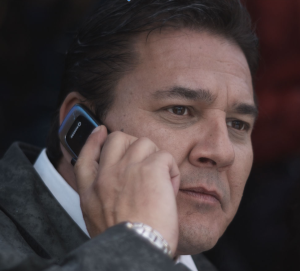Christian Carnage and Attacked Churches in Egypt
As a reflection of the enmity that Christmas provokes in the Islamic world, “Egypt’s interior ministry… said it would be allocating 230,000 security personnel to secure the country’s Christmas celebrations,” the Egyptian newspaper al-Ahram reported, “to protect 2,626 churches nationwide during the celebrations.” Security measures were further “updated to ensure the safety of CCTV and metal detectors systems at all churches across the country.”
Despite these precautions, Muslim assailants managed to slaughter Christians and terrorize churches:
On December 9 in Cairo, two Islamic terror attacks claimed a total of eight Christian lives and wounded several others.
In the first attack, Muslim militants raided a Christian-owned appliance store and killed two Christian brothers.
A little later, and in the same area, two armed terrorists opened fire on the Mar Mina Coptic Orthodox Church as its members were leaving the service. The death toll might have been significantly higher had church security not been present. At least six worshippers were killed (earlier and conflicting accounts said as many as 12); one security officer was also killed in the shooting. One of the perpetrators was wearing an explosives belt and had a machine gun with 150 rounds, suggesting that the terrorists had plans for a more spectacular suicide attack that would have claimed many more lives.
A Sunday school teacher present during the church attack described the incident:
There was a situation of terror among all the people inside the yard: they all were screaming and running. The situation was terrible, the sound of the shooting was very dense and lasted more than 20 minutes…. it was like war against the church…
Another church congregant added:
“These terrorists arranged the attack of the church with precision. They knew everything about the church and the time of the ending the mass… One of them was wearing [a] suicide vest under his clothes and tried to enter the church while the worshippers were leaving the church to explode himself and kill many of them… but the police managed to shoot him and prevent him from storming the church.”
Separately, a young Christian boy was randomly targeted for torture, mutilation, and murder by three Muslim men, in part “to intimidate Copts ahead of Christmas,” said his pastor. More than a week after he disappeared, the body of 14-year-old Ishak (Isaac) Nashaat Birwan was found in a canal on December 20. Based on the post-mortem, Samir Fekry, the slain’s cousin, said “Ishak’s body had facial deformities, it had no eyes and there were signs of torture on different parts of his body.” The family eventually learned from local sources that three men had asked the young teen for a lift on December 9: “Ishak then disappeared and there was no word from him. We tried to call him many times but his mobile phone was turned off. We searched for him everywhere in our village and the villages nearby, but we couldn’t find him.” Although the family had gone to police on the same day the youth disappeared, “none of them did anything to help us investigate the matter,” added Samir. “Ishak had no enemies … After kidnapping him, none of the kidnappers contacted us demanding any ransom for his return. So why was he killed? Was it because he is a Christian?”
The church’s pastor, Rev. Adel Rafaat, had no doubts:
“Ishak was targeted and killed because of his faith, because he is Christian. They wanted to spoil the joy of our coming Christmas. Extremists chose a young man from our village specifically because our village is a big Christian village and their aim was to turn Christmas joy of the villagers to sadness.”
Rev. Rafaat added that “Ishak was a very good young man” who “was loved by all of us and he loved everybody. He always had a smile.”
Also separately, on December 22, after Friday prayers, a mob consisting of hundreds of Muslims chanting hostile Islamic slogans stormed a church in Giza. According to the report”
The incident itself was sparked by the circulation of a rumor within the village’s Muslim population that church officials were installing a bell. This led to villagers with extremist views to incite the village’s Muslims to attack the church…. The mob smashed chairs, destroyed much of the church’s interior contents, and assaulted Christians who were present, before security forces were able to step in…. [T]he church was established in 2002 after an agreement between the village’s Muslim and Christian populations, on the condition that it would be a small building for prayer, without a crucifix on display, not a dome, a bell, or a beacon….
According to the well-known Conditions of Omar, which are believed to have been promulgated by the second caliph of the same name, churches may not have bells or visible crosses. Discussing this incident, the Associated Press wrote:
“The church … is yet to be sanctioned by the state but has been observing prayers for 15 years. The diocese said it had officially sought to legalize the building’s status… Local authorities often refuse to give building permits for new churches, fearing protests by Muslim conservatives. That has prompted Christians to illegally build churches or set up churches in other buildings. In contrast, building a mosque results in few restrictions.”
Although security arrested 14 Muslims—both to portray the incident as a “sectarian clash” and to pressure Christians to “reconcile” with their persecutors — authorities, as usual, also arrested three Christians who fought back the Muslims.
Some of these attacks are thought to have been incited by the Islamic State. On December 4, it issued the following message through its satellite affiliates:
Oh you Muslims in Egypt, the Christians have been insolent toward you. They cursed our prophet and called each other to fight you, and you are sitting! Oh you, have you forgotten who you are? Do you not know that you are their masters and they are the ones [who should be] humbled and subdued? [a reference to Koran 9:29]. By Allah… if you do not rise up [against them] Allah will increase your humility. So go forth, oh worshippers of Allah, blow up their churches and monasteries, kill their priests and monks, do not show mercy toward any Christian for they are all belligerent toward Allah’s religion. ‘They will never approve of you until you follow their religion.’ [Koran 2:120] So blood for blood, killing for killing. Revive the raids of heroes in Abbasiyah, Tanta and Alexandria [references to earlier Coptic church bombings that left about a hundred worshippers dead] until they know who the Muslims are.
In a different incident, and despite conflicting initial reports, the motive behind a 19-year-old Muslim man’s public slaughter of a Christian priest was confirmed on December 3: the man had been looking for “any priest” to kill. He came upon his victim, Samaan Shehata — whom the murderer repeatedly struck with a cleaver on the head, neck, and torso — in the streets of Cairo on October 12. Discussing this incident, Coptic Bishop Angaelos of the United Kingdom, said:
“Another day in Egypt with another Coptic Christian murdered. Why should a priest not be able to walk safely down a street?… Coptic Christians, who have endured injustice, persecution, and loss of life for centuries without retaliation, repeatedly forgiving unconditionally, deserve to live with respect and dignity in their indigenous homeland.”
Another report that appeared in December notes that, since December 2016, Egypt’s Christian minority has been targeted by Islamic militants in a series of attacks—including the suicide bombings of two churches on Palm Sunday and another during the previous Christmas season—that have left at least 115 deadand hundreds wounded.
Christian Carnage in Pakistan
On Sunday, December 17, two Islamic suicide bombers attacked a Methodist church in Quetta during church service; at least nine worshippers were killedand 50 injured, some critically, from the blast. Stationed police managed to shoot and kill one of the attackers outside the building, though the second was able reach the main entrance of the church and detonate himself. Because the attack occurred so close to Christmas, nearly double the amount of congregants that usually attend were present, making it ripe for a suicide attack. According to an official, “if the terrorists had succeeded in their plans more than 400 precious lives would have been at stake.” One man, who was shot in his right arm, said he heard a blast during the service and heavy gunfire: “It was chaos. Bullets were hitting people inside the closed hall.” Video footage shows blood-splattered floors, destroyed pews and musical instruments.
Earlier, on Sunday, December 3, Islamic terrorists hurled a hand grenade at the gates of a Christian neighborhood. Three Christians — including a 7-year-old boy — were killed in the explosion. Others, including another child, were injured and homes damaged. A human rights activist said, “the attack on Christians was simply because of the pariah status they have in Pakistan…. A consequence of years of hate ideology having been inculcated in the minds of young people in Pakistan, through the use of media and a national curriculum that demonizes minorities.” He also accused the state media of deliberately suppressing the incident for the same reason—that Christian lives are un-newsworthy.
Another also Christian died in prison.
He is the sixth Christian to die under mysterious circumstances while in captivity since 2009. Although his brother, who had visited the prisoner five days before his death, had described him as “perfectly healthy,” authorities claimed that the 29-year-old Usman Shaukat died of a “heart attack” on December 9. According to one report, however, the deceased’s “body was littered with bruises and welts, creating suspicion around the reasons behind his death.” A Christian activist acquainted with the case said: “Negligence and violence has led to the death of a man believed to be totally innocent by the Christian community.” He was one of hundreds of Christians tried — and severely tortured — over the lynching of two Muslims involved in the simultaneous suicide attacks on two packed churches in Lahore in 2015 that left many dead and wounded. Earlier Usman and other Christian prisoners rejected a pardon offer on condition that they convert to Islam.
Christian Carnage in Nigeria
Two days before Christmas, a gunman invaded a Christian village as its residents were singing Christmas carols and opened fire; four revelers were killed and up to ten others wounded. The murderer is believed to have been one of the Muslim Fulani herdsmen, who Christian leaders in Nigeria say are waging a jihad against Christians. According to the local pastor, the attack occurred during “an interdenominational carol that comes every Christmas with Bible quiz, drama, songs and preaching.” Local authorities issued a statement adding, “We have once again come under unprovoked and gruesome attack two days before Christmas. This has left us wondering why people who had gathered peacefully for joyful Christmas carols in their village should be gunned down for no reasons.”
More generally, and in what many are describing as a concerted genocide against Christians, Muslim Fulani herdsmen slaughtered more than 100 Christians just in the month of December. Among other atrocities, according to a report, the Muslim “herdsmen raped and killed a pregnant woman on her farm,” When her husband and brother tried to intervene, they too were slaughtered. Fulani raids have led to the slaughter of “an estimated 60,000 people since 2001 in Nigeria alone.”
Nigeria’s government, when not responding with apathy, appears also to be participating in these ongoing raids on Christians. The report noted that one of the December “attack[s] razed several villages in the southern part of the state, and a military jet bombed a Lutheran church and other targets… Some people suspect the jets were deployed in collaboration with the terrorists because their bombs hit villagers.” Femi Fani-Kayode, former Minister of Aviation, was even more direct in his accusation against Nigerian president Muhammadu Buhari:
“Hundreds of indigenous Numan Christians in Adamawa state were attacked and killed by jihadist Fulani herdsmen. When they tried to defend themselves the Buhari govt. sent in the Airforce to bomb hundreds of them and protect the Fulani aggressors. ‘Is this fair? WORLD TAKE NOTE!’ he tweeted.”
Muslim Threats and Attempts against the West During Christmas
In the days leading up to Christmas, as people were “getting into the Christmas spirit with lights and trees being put up in many parts of the world,” explains a report, ISIS supporters shared “a propaganda image, in which the group threatens to attack NYC at Christmas time.” Santa Claus appeared on the roof of a building overlooking Times Square; next to him was a box of dynamite. The caption on the poster read: “We meet at Christmas in New York… soon.” Other posters depicted crowds of revelers at Christmas markets in France, Germany, and the UK, with captions written in their respective languages, saying, “Soon on your holidays.” Another poster showed a jihadi holding a rocket launcher and overlooking Saint Peter’s Square in the Vatican. As there have been several jihadi strikes around Christmas time in the West, including the Christmas market attack in Berlin, 2016 — various nations went into high security alert.
In the United States of America, on December 11, 27-year-old Akayed Ullah, a Muslim immigrant from Bangladesh and Islamic State sympathizer, partially detonated a pipe bomb during rush hour in a crowded New York City subway. Four people and he were injured in the failed terrorist attempt. According to one report, Ullah “chose to bomb one of New York City’s busiest subway corridors because of its Christmas-themed posters,” and in emulation of previous terror “strikes in Europe against Christmas markets.” Had the low-tech bomb detonated properly, officials said, many could have been killed.
In Germany, a “600-year-old school in Germany has ditched Christmas celebrations during class time after a Muslim pupil said that carols were incompatible with Islam,” stated a report. As a result, the headmaster said the school would henceforth take “a sensitive approach” to the festive season, including by postponing and making voluntary its annual Christmas party, in which everyone had traditionally participated. The headmaster also explained that music lessons at the school would no longer incorporate songs with Christian themes or lyrics in order to “show consideration to pupils from minority faiths.” Bianca Schöneich, a local authority, agreed with these decisions, adding that “religious content in schools should be done in moderation,” and that “a Christmas party should not have the character of a church service.” Others, including Auxiliary Bishop Nikolaus Schwerdtfeger rejected this “overly sensitive approach”. “The fact that a school Christmas party cannot take place during class time, I find a pity and also a bit absurd,” he said. One student similarly wondered why “Something that was never a problem before is now being made into one.”
| The Johanneum Gymnasium in Lüneburg, a 600-year-old high school, “ditched Christmas celebrations during class time after a Muslim pupil said that carols were incompatible with Islam,” according to a report. (Image source: Stonecello/Wikimedia Commons) |
Finally, there would likely have been even more attacks in around the Muslim world if not for the implementation of unprecedented security measures. Reuters reported in an article entitled, “Armed guards posted at Christmas church services in majority Muslim countries,” that “Christmas church services and other celebrations are being held this weekend under the gaze of armed guards and security cameras in many countries…” In “Indonesia, the world’s biggest Muslim-majority country, police said they had stepped up security around churches and tourist sites, mindful of near-simultaneous attacks on churches there at Christmas in 2000 that killed about 20 people.” In Pakistan, “where an Easter Day bombing in a park last year killed more than 70 people,” police “said every church would be monitored with CCTV cameras as part of security measures.”
Muslim Attacks on Christian Freedom
Indonesia: On December 8, members of the nation’s second largest Islamic organization, “Muhammadiyah,” filed a police complaint accusing a Protestant pastor, Reverend Abraham Ben Moses, 52, of committing blasphemy against Islam’s prophet Muhammad. According to the report:
“It is the first time a Christian cleric has been accused of blasphemy in the predominantly Muslim country…. [He] was arrested after a video featuring a conversation involving him and a taxi driver went viral on social media. In the video, Rev. Moses is heard quoting the Quran on marriage and claiming that the Prophet Muhammad was inconsistent with his teachings. He is also heard asking the taxi driver to convert to Christianity.”
Moses was subsequently sentenced to four years in prison.
Uganda: An apostate from Islam who has been persecuted by local Muslims since he converted to Christianity more than two years ago—they took his wife and three young children from him—was beaten unconscious. Mulangira Ibrahim, 27, was walking toward his pastor’s home when an unknown person called him and said the pastor wanted to meet him behind the church. Ibrahim recalled:
“On my way to the church premise, four people stopped me and then got hold of me and started threatening me that if I do not recant Christianity and return to Islam, then they were going to kill me. I did not answer them, and one began slapping me, while another hit me with a blunt object. As I started screaming for help, I received more blows and from there I lost my consciousness.”
He awoke to find his pastor, several church members, and police standing over him. “Ibrahim suffered backache, head and leg injuries, and we found him in a pool of blood,” said his pastor. “The attack was so severe that it will take more than a month for Ibrahim to recover from the multiple injuries.”
Algeria: Police arrested three Christians for being “in possession of Christian literature, and took them to the police station where they were investigated at length by the national gendarmerie,” a report says.
“A local newspaper, known for its hostility to Christians, described the incident as a ‘foiled evangelism attempt,’ falsely accusing the Christians of working under the cover of humanitarian activities and of alluring young Muslims to convert by means of financial and travel inducements. The three believers were released but may face charges of proselytism.”
Iran: On December 12, authorities disrupted a house church gathering; they arrested four Christian men and took them to an unknown location. According to a human rights activist acquainted with the case, the four likely endured “a period of interrogation at this stage. Usually, they’ll be called upon to giveaway more information on other house churches and other Christian leaders. So it’s a difficult time.” He continued:
A great many Iranians have been coming to Christ and it’s something which the authorities are clearly very unhappy about. So there are periodic arrests, detentions, [and] imprisonments. There have been a lot of charges lately which are suggesting an even greater clampdown—sentences of 10-15 years in some cases for Christians. And usually, the authorities will suggest that this [is] the result of undermining the state or seeking to collaborate against the state and will use more political charges than say apostasy or blasphemy laws.
Mali: The situation for Christians continues to deteriorate. According to one report, “Despite a 2015 peace deal with the government, self-proclaimed jihadist armed groups continue to pose a threat to Christians and other minority groups…” One Christian man, Sory, said:
“I started to face serious problems when the Islamists heard about me and the conversion of some of the people [from Islam to Christianity]. They sent me warnings through friends, telling me to stop talking about Jesus or risk getting killed. They said they knew it was easy to kill Christians because [Christians] don’t have any weapons. They can simply be slaughtered.”
Not long after that, the jihadis launched a nearby raid and killed one security officer. “Neighbours warned me that they were also looking for me. I did not waste a moment, but fled immediately.” Because he did not even wait to put on his shoes, “I was in so much pain [from thorns in his feet] that I couldn’t walk any further. In the end, I tore some fabric from my trousers and tied that around my feet to continue going.” He eventually returned to find his wife and children, who had taken refuge with neighbors. “They were badly traumatised by the incident. One of my daughters still struggles to forget what happened and whenever she hears a vehicle outside the house, she flees indoors and clings to us.”
Raymond Ibrahim, author of the new book, Sword and Scimitar, Fourteen Centuries of War between Islam and the West, is a Senior Fellow at the Gatestone Institute and a Judith Rosen Friedman Fellow at the Middle East Forum
About this Series
While not all, or even most, Muslims are involved, persecution of Christians by Muslim extremists is growing. The report posits that such Muslim persecution is not random but rather systematic, and takes place irrespective of language, ethnicity, or location.
Previous reports
- November, 2017
- October, 2017
- September, 2017
- August, 2017
- July, 2017
- June, 2017
- May, 2017
- April, 2017
- March, 2017
- February, 2017
- January, 2017
- December, 2016
- November, 2016
- October, 2016
- September, 2016
- August, 2016
- July, 2016
- June, 2016
- May, 2016
- April, 2016
- March, 2016
- February, 2016
- January, 2016
- December, 2015
- November, 2015
- October, 2015
- September, 2015
- August, 2015
- July, 2015
- June, 2015
- May, 2015
- April, 2015
- March, 2015
- February, 2015
- January, 2015
- December, 2014
- November, 2014
- October, 2014
- September, 2014
- August, 2014
- July, 2014
- June, 2014
- May, 2014
- April, 2014
- March, 2014
- February, 2014
- January, 2014
- December, 2013
- November, 2013
- October, 2013
- September, 2013
- August, 2013
- June, 2013
- May, 2013
- April, 2013
- March, 2013
- February, 2013
- January, 2013
- December, 2012
- November, 2012
- October, 2012
- September, 2012
- August, 2012
- July, 2012
- June, 2012
- May, 2012
- April, 2012
- March, 2012
- February, 2012
- January, 2012
- December, 2011
- November, 2011
- October, 2011
- September, 2011
- August, 2011











![TORONTO, ONTARIO: OCTOBER 14, 2015--PLAYOFFS--Toronto Blue Jay Kevin Pillar makes a diving catch in the fourth inning agsint Texas Rangers player Elvis Andrus in game five of the ALDS MLB playoff series at Toronto's Rogers Centre, Wednesday October 14, 2015. (Tyler Anderson/National Post) [For Sports story by John Lott, Eric Koreen and Scott Stinson/Sports] //NATIONAL POST STAFF PHOTO ORG XMIT: POS1510141654520755](/wp-content/uploads/2018/05/toronto-ontario-october-14-2015-playoffs-toronto-blue-j.jpeg)




 Holy Bible, New International Version®, NIV® Copyright ©1973, 1978, 1984, 2011 by Biblica, Inc.® Used by permission. All rights reserved worldwide.
Holy Bible, New International Version®, NIV® Copyright ©1973, 1978, 1984, 2011 by Biblica, Inc.® Used by permission. All rights reserved worldwide.



